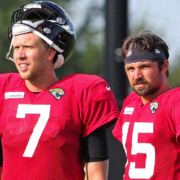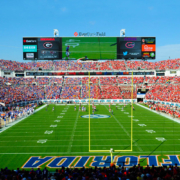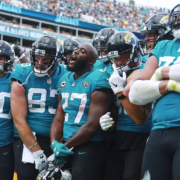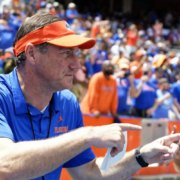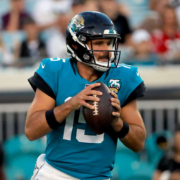Minshew or Foles? No Rush
In some ways the game against the Texans in London will help determine what happens with the Jaguars for the rest of this season and beyond. The decision at quarterback won’t be an easy one, and it could have franchise implications for years to come.
With a win at Wembley, the Jaguars will have won three straight with Gardner Minshew at quarterback, moved to 5-4 and have a say in who wins the AFC South.
In that scenario, it’s hard to take Minshew out of the lineup in favor of Nick Foles. You almost have to go with the hot hand.
If the Texans win, the Jaguars are 4-5 and are looking up at both Houston and Indianapolis in the division, at least two games behind with seven to play.
There are plenty of situations in the past where the head coach had to make a decision where to go at quarterback when the established starter has been injured but the backup plays well. Doug Marrone says he hasn’t thought about it one bit, so far.
“Why would I go through scenarios in my mind and waste my time with scenarios when I have to get ready for another game,” he said this week. “If we didn’t have a bye after the Texans game, I think somewhere along the line next week, I would start going through that in my mind. I really haven’t thought about it. The reason why is because I don’t have to, and I don’t want to. I’ll deal with it when it happens.”
I don’t think the money they’re paying Foles comes into the equation right now. If it’s about winning, which quarterback gives them the best chance to do that? You don’t know how this team plays with Foles as the starter. He got hurt after two series in the opener. He did throw a touchdown pass on the play when he was injured. You can go by the old adage that player’s don’t lose their starting jobs to injury. Or you can say Minshew throws all of the old adage’s out the window.
Ultimately It’ll be Marrone’s decision but actually what happens is up to Minshew. Marrone has to take into consideration the emotional impact Minshew has on the team. Call it “Minshew Magic” or call it chemistry but there’s no question he inspires the guys in that locker room.
That’s why it’ll be up to him. If they lose to Houston in London and the Jaguars brass decides to put Foles back in the lineup when they resume in two weeks against Indy, Gardner has to go along with it. I mean really go along.
If he says, “Yeah, I’m cool with it. Nick’s a great player and he’s our starter,” his teammates will buy into it.
But if he comes out and says, “It was a coach’s decision and I’ll stick to that” then there’s trouble in River City. The team will lose their motivation and unless Foles plays lights out, the season will grind to a halt.
There are plenty of examples in the past of injured starters and their backups: John Unitas and Earl Morrall, Morrall and Bob Griese, Jeff Hostetler and Phil Simms. This year Drew Brees was back in the lineup after his backup; Teddy Bridgewater went 5-0 as the starter while Brees was out with a thumb injury.
Morrall came in for an injured Griese in game five of the ’72 season. He won 12 straight games for the Dolphins, including playoff wins over Oakland and Pittsburgh. Head Coach Don Shula put Griese back in the game as the starter in Super bowl VII against Washington to finish their perfect season.
Morrall told Shula, “I think I should play, but I’m not going to make a problem.”
These next three games will determine what kind of season 2019 will be for the Jaguars. Three division games, none of them here in Jacksonville. Win two out of three and they’ll be a favorite in four of their last five games (maybe not against the Raiders in Oakland) with a realistic shot at the post-season. Lose two out of three and it’s an uphill slog where they’ll need help to make the playoffs.
Virtually the same scenario happened to the 1978 New York Jets. Richard Todd was the Jets starter but broke his collarbone four weeks into the season. Second-year quarterback Matt Robinson came in and led the Jets into playoff contention over the next twelve games.
“We missed a field goal at the end of the game twelve games in against the Patriots in Shea Stadium to really be in the thick of it,” Robinson recalled.
Head Coach Walt Michaels had started Todd against New England, only to see him falter. He put Matt back under center mid-game. Robinson threw two fourth-quarter touchdown passes to revive the Jets chances.
“When Walt started Richard the next game, that split the locker room,” Robinson said. “And we were done. We missed the playoffs.”
That’s the dilemma the Jaguars face. Can you flip-flop your quarterbacks and not lose the locker room? If they start Foles against the Colts and he falters, do they return Gardner to the lineup?
Marrone already knows what Minshew can do.
“Sometimes I look and you’re like, ‘That’s a veteran move. That’s a veteran player,’” he said after the win against New York. “He does not play like he was brought into this league, a sixth-round draft pick or something like that. He doesn’t play like that.”
It’s going to have to be a gut call. Win in London and let Minshew keep playing. Foles has shown to be the best reliever in the game if things go south. Lose to the Texans and put Foles in the lineup. He can make throws Minshew can’t. He doesn’t have Gardner’s mobility or his ‘magic’ but he’s a proven winner. Give Minshew a chance to watch and learn some more, give him some seasoning. You know he can play.
There shouldn’t be any rush here. The Packers had Brett Favre and Aaron Rodgers on their roster together for three years. Foles and Minshew can co-exist.
As Minshew said when asked what he thought of Foles coming back to practice two weeks ago:
“I think we’re pretty good at quarterback.”

